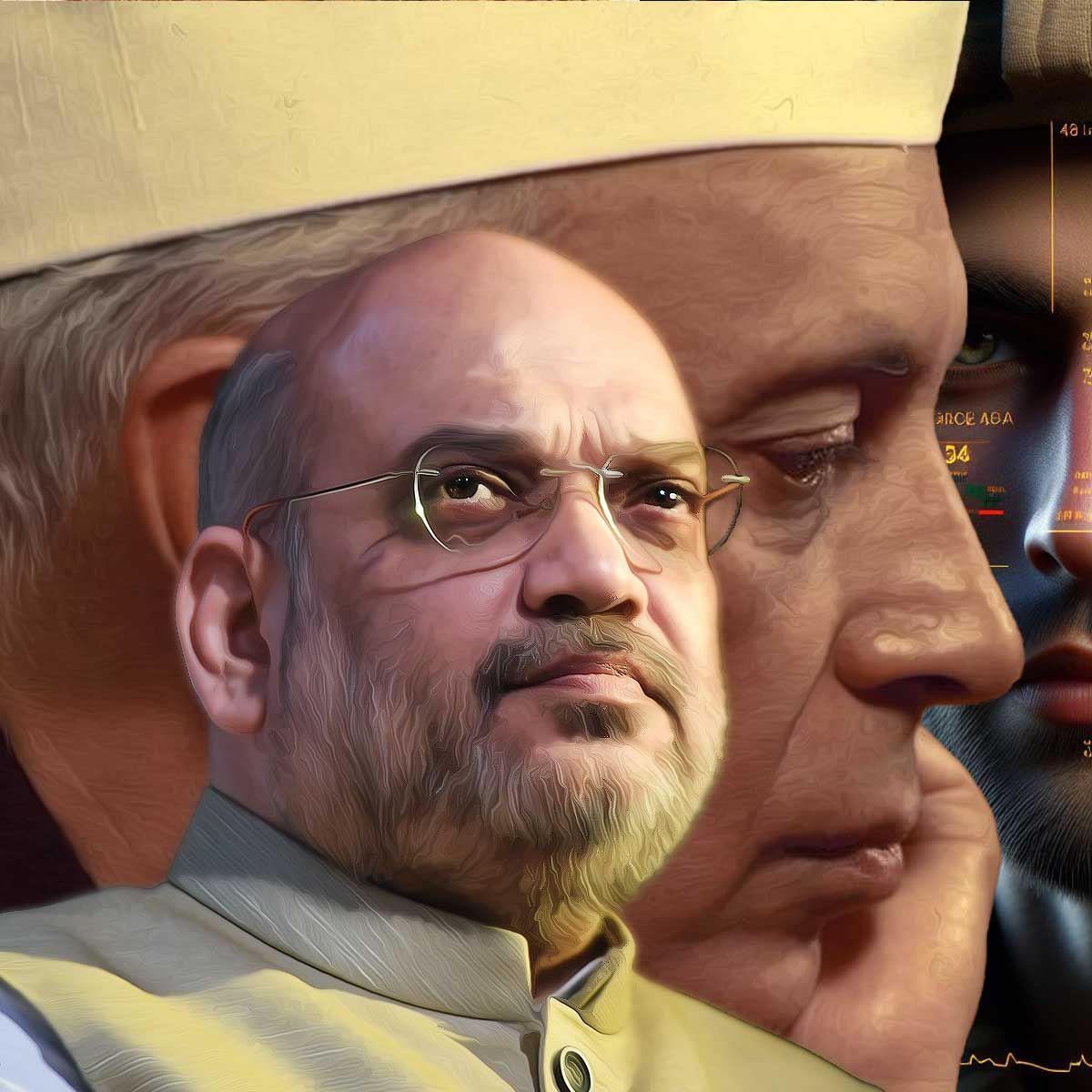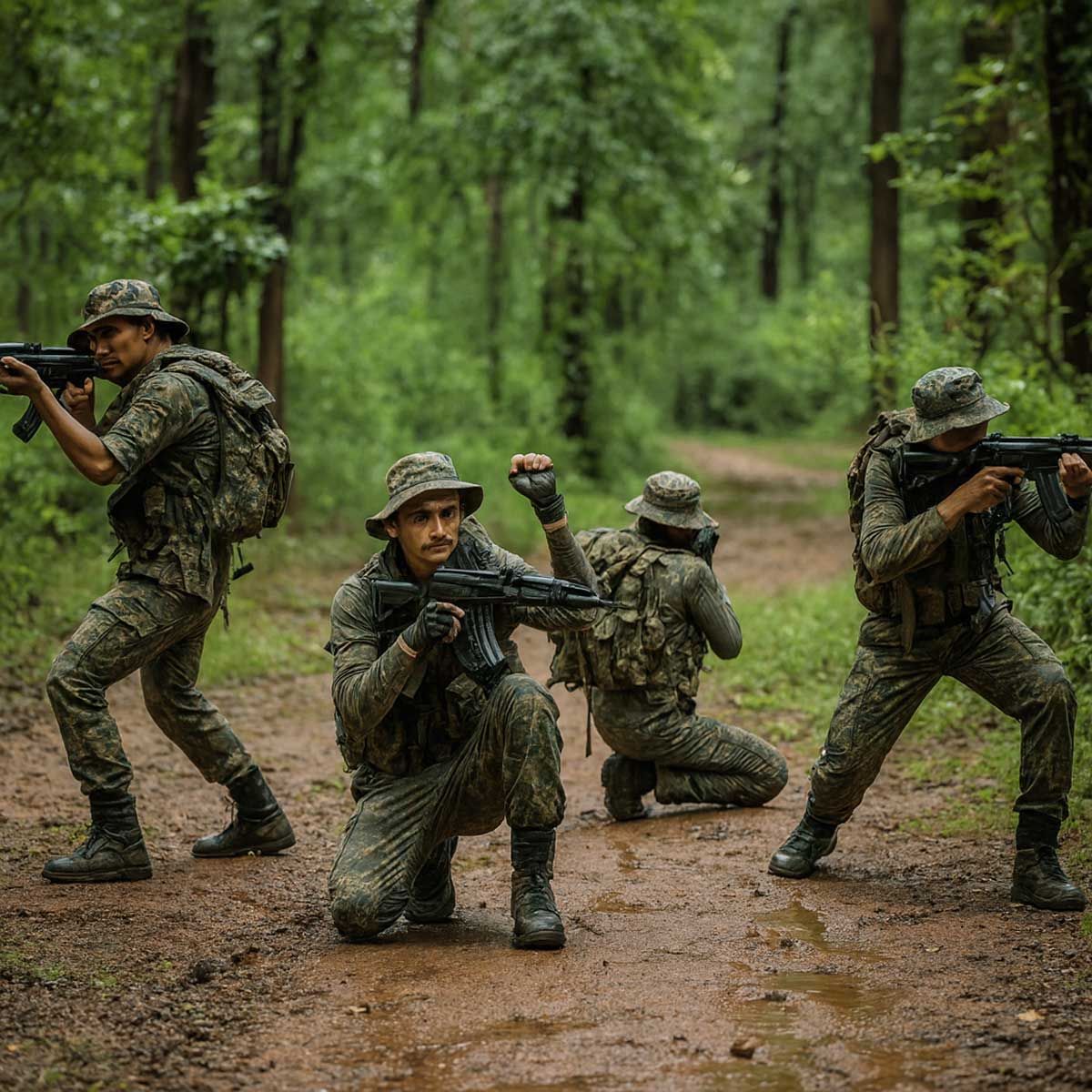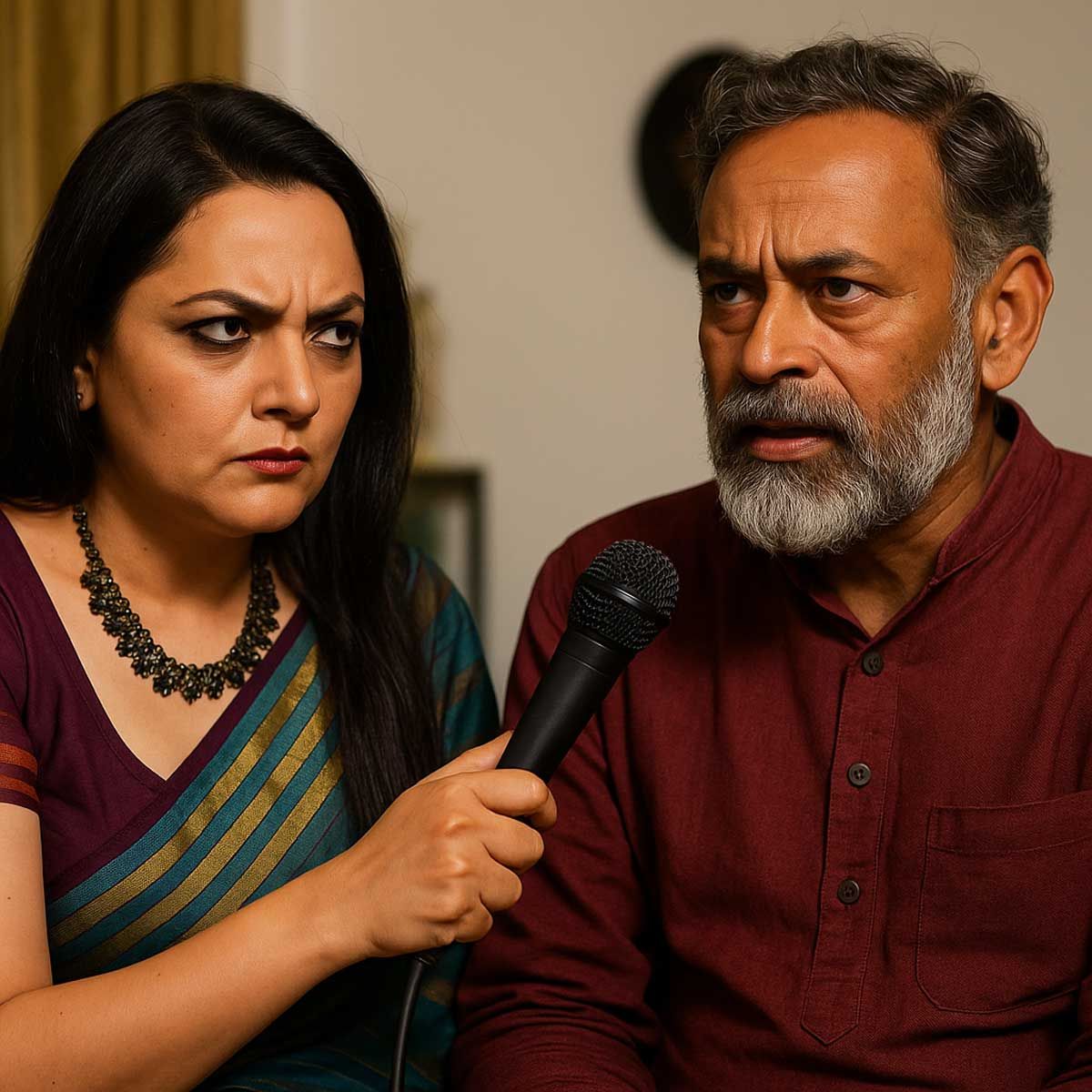More Coverage
Twitter Coverage
Satyaagrah
Written on
Satyaagrah
Written on
Satyaagrah
Written on
Satyaagrah
Written on
Satyaagrah
Written on
JOIN SATYAAGRAH SOCIAL MEDIA
"जब तक तोड़ेगा नहीं तब तक छोड़ेगा नहीं": Amit Shah unearths Nehruvian blunders, says ’PoK wasn’t a mistake, it was a blunder,’ leaving the opposition fuming; Shah stands firm, affirming Kashmir's suffering due to historical missteps under Nehru's rule

In a fiery address to the Lok Sabha, Union Home Minister Amit Shah unequivocally defended the government's actions, notably the abrogation of Article 370 and Article 35A, in the context of the Jammu and Kashmir Reservation (Amendment) Bill, 2023, and the Jammu and Kashmir Reorganisation (Amendment) Bill, 2023.
Shah's assertion that "PoK wasn't a mistake, it was a blunder" sent shockwaves through the chamber, emphasizing the gravity of what he deemed as historical missteps. The statement not only underscores the government's strong stance but also sets the tone for a candid evaluation of past decisions related to Kashmir.
In addressing the Congress's skepticism regarding the claimed decline in terror incidents post the abrogation, Shah skillfully defended the move. His response serves as a robust counterargument, challenging the opposition's persistent doubts and reinforcing the government's narrative on the positive impact of these constitutional changes.
The Home Minister's deliberate choice of words, especially labeling the events as 'Nehruvian blunders,' injects a historical context into the debate. This phrase not only points fingers at specific decisions made during the era of India's first Prime Minister but also lays the groundwork for a comprehensive critique of the historical policies that have shaped the Kashmir issue.
As the Lok Sabha resonates with Shah's resolute defense, the unfolding narrative sets the stage for a deeper exploration of the Jammu and Kashmir Reservation (Amendment) Bill, 2023, and the Jammu and Kashmir Reorganisation (Amendment) Bill, 2023, providing the readers with a comprehensive understanding of the ongoing debate.
Union Home Minister Amit Shah, in a detailed exposition, outlined the multifaceted approach taken by the Central government to combat terrorism, quell separatism, and usher in a sense of normalcy to the region of Jammu and Kashmir. His comprehensive list of measures serves to underscore the government's commitment to addressing the complex challenges that have plagued the region.
In the latter part of his address, Shah addressed the contentious usage of the term "Nehruvian blunder," a phrase that drew objections from the Opposition benches. Shah, undeterred, staunchly defended the choice of words, stating, "I want to support the usage of the word Nehruvian blunder. Kashmir had to suffer due to the blunder that had happened during Nehru’s rule." This direct acknowledgment of historical mistakes during Jawaharlal Nehru's leadership adds a layer of accountability to the discourse, emphasizing the need to rectify past errors for the region's betterment.
The Home Minister's willingness to engage in a dedicated debate on Kashmir and Nehru's role, as proposed by the Leader of Opposition Adhir Ranjan Chowdhury, signals a democratic openness to discuss and dissect the historical context. Shah's assurance of readiness sets the stage for a substantive and constructive dialogue, providing an opportunity to delve into the complexities of Kashmir's historical trajectory.
Union Home Minister Amit Shah, in a bold revelation, highlighted two critical mistakes attributed to former Prime Minister Jawaharlal Nehru, asserting that these errors became enduring burdens for Kashmir. Shah's unflinching scrutiny of historical decisions adds a layer of accountability, shaping the discourse on the region's trajectory.
|
Shah pinpointed the first major misstep, stating, "Two mistakes that happened due to the decision of (former PM) Pandit Jawaharlal Nehru due to which Kashmir had to suffer for many years. The first is to declare a ceasefire – when our army was winning, the ceasefire was imposed. If there had been a ceasefire after three days, PoK would have been a part of India today…" This candid assessment sheds light on the consequences of a premature ceasefire, emphasizing the missed opportunity to integrate Pakistan-occupied Kashmir (PoK) into India. Shah's assertion challenges historical narratives and prompts readers to rethink the outcomes of decisions made during critical junctures.
The second pivotal mistake, as outlined by Shah, was Nehru's decision to internationalize India's internal matter by taking it to the United Nations. This move, according to Shah, exacerbated the challenges faced by Kashmir. The Home Minister's forthright analysis positions these decisions as root causes of the prolonged suffering in the region.
To strengthen his argument, Shah quoted former Prime Minister Jawaharlal Nehru directly from a letter to Sheikh Abdullah, sourced from the Nehru Memorial and Library, Jawaharlal Nehru collection, JNSC 143. By relying on Nehru's own words, Shah brings authenticity to his assertions, compelling readers to confront the historical documentation and its implications on Kashmir's troubled past.
In a dramatic turn of events, Union Home Minister Amit Shah unearthed a poignant excerpt from former Prime Minister Jawaharlal Nehru, shedding light on the aftermath of the United Nations' involvement in the Kashmir issue. Shah, quoting Nehru directly, revealed, "After the experience with the United Nations (UN), I have concluded that a satisfactory result cannot be expected from there. I considered this a good decision (ceasefire) but this matter was not dealt with properly. We could have deliberated some more on the ceasefire and come out with a better solution. And I think this was a mistake we made in the past." This rare glimpse into Nehru's introspection highlights the regret over the handling of the ceasefire, hinting at missed opportunities for a more favorable resolution.
Amit Shah, turning to the Opposition benches, posed a direct question, asking if they objected to Nehru's own admission. The Congress responded affirmatively, prompting a swift counter from Shah, "Why are you telling me Nehru Nehru Nehru, Nehru has himself said this," he asserted. This fierce exchange underscored the significance of Nehru's self-critique, leaving the opposition momentarily disarmed.
The Congress's outrage and subsequent walkout further intensified the atmosphere, highlighting the sensitivity of revisiting historical decisions. Shah's strategic use of Nehru's own words not only strengthens his argument but also challenges the opposition's narrative, forcing them to confront the candid acknowledgment of past mistakes by their party's iconic leader.
Union Minister Jitendra Singh, earlier today, added his voice to the ongoing discourse, taking a sharp jab at the Congress. Singh, in a scathing remark, asserted, "Those who did not implement the Constitution of India in J&K are today teaching those who sacrificed 3 generations to implement the Constitution in the valley." This pointed commentary draws attention to the paradoxical position of the Congress, highlighting a perceived inconsistency between their historical actions and present-day rhetoric.
Singh delves into the consequences of what historians have labeled the "Nehruvian Blunder," emphasizing its role in the delayed integration of Jammu and Kashmir into India in 1947. The accusation that Nehru's belief in his superior understanding of the region hindered collaboration with his own Home Minister, Sardar Patel, is a powerful indictment. This revelation invites readers to reflect on the intricate dynamics within the leadership during a critical period in India's history, shedding light on the complexities that influenced decisions related to Jammu and Kashmir.
The use of the term "Nehruvian Blunder" resonates with the overarching theme of the article, connecting the narratives presented by Amit Shah and Jitendra Singh. This term becomes a pivotal link, symbolizing historical missteps that have had enduring consequences on the region. Singh's critique contributes to the unfolding narrative, urging readers to critically examine the intricacies of political decisions and their lasting impacts on the socio-political landscape of Jammu and Kashmir.
|
Union Minister Jitendra Singh, in a revelatory account, exposes a critical chapter in Indian political history, shedding light on the dismissal of concerns about Article 370 by Pandit Jawaharlal Nehru. Singh discloses, "He added that Nehru dismissed Mukherjee’s concerns about Article 370 which were reiterated by former Prime Minister Lal Bahadur Shastri during a debate in the House in 1963." This revelation underscores the early awareness and articulation of apprehensions surrounding Article 370, suggesting that these concerns were not only raised but were also reiterated by subsequent leaders, including Lal Bahadur Shastri.
Singh elaborates further, stating, "In 1963, Pandit Nehru himself acknowledged the need to address Article 370. However, neither Nehru nor subsequent governments took concrete steps to repeal Article 370, allowing it to become an entrenched political issue," highlighting a critical turning point in the history of Article 370. Nehru's acknowledgment of the need for attention to this constitutional provision adds complexity to the narrative, revealing an awareness that did not translate into concrete actions.
The term "entrenched political issue" encapsulates the enduring nature of the problem, suggesting that the failure to address Article 370 has led to its persistence as a focal point in the political discourse. Singh's account invites readers to reflect on the historical decisions that contributed to the complexities surrounding Article 370, prompting a nuanced examination of the factors that allowed it to evolve into a contentious and unresolved issue.
As the article concludes, the revelations presented by Jitendra Singh contribute to the overarching narrative, offering a deeper understanding of the historical oversights and political dynamics that have shaped the discourse on Jammu and Kashmir. The concluding section serves as a reflection on the missed opportunities and the enduring consequences of decisions made during critical junctures in India's political history.
 Support Us
Support Us
Satyagraha was born from the heart of our land, with an undying aim to unveil the true essence of Bharat. It seeks to illuminate the hidden tales of our valiant freedom fighters and the rich chronicles that haven't yet sung their complete melody in the mainstream.
While platforms like NDTV and 'The Wire' effortlessly garner funds under the banner of safeguarding democracy, we at Satyagraha walk a different path. Our strength and resonance come from you. In this journey to weave a stronger Bharat, every little contribution amplifies our voice. Let's come together, contribute as you can, and champion the true spirit of our nation.
 |  |  |
| ICICI Bank of Satyaagrah | Razorpay Bank of Satyaagrah | PayPal Bank of Satyaagrah - For International Payments |
If all above doesn't work, then try the LINK below:
Please share the article on other platforms
DISCLAIMER: The author is solely responsible for the views expressed in this article. The author carries the responsibility for citing and/or licensing of images utilized within the text. The website also frequently uses non-commercial images for representational purposes only in line with the article. We are not responsible for the authenticity of such images. If some images have a copyright issue, we request the person/entity to contact us at This email address is being protected from spambots. You need JavaScript enabled to view it. and we will take the necessary actions to resolve the issue.
Related Articles
- Union Home Minister Amit Shah declares no govt jobs for families of terrorists or stone pelters in J&K, highlights the govt's crackdown on terror funding, PFI ban, and Amritpal Singh's NSA arrest, with a significant drop in terror incidents and casualties
- Since the abrogation of article 370, nearly 1700 Kashmiri Pandits are appointed by the Jammu and Kashmir government in various departments: Centre in Rajya Sabha
- An old speech of PM Narendra Modi that gives goosebumps has gone viral on social media: A walk down memory lane when 30 years back PM Modi unfurled India’s tricolour flag at Lal Chowk in Srinagar during Ekta Yatra
- From the release of all political prisoners from jails to asking India to quit the World Trade Organization are the bizarre demands of BKU (Dakaunda) - Holds massive rally, says will ask questions of Congress and AAP too
- ‘Inappropriate question’ on Gujarat riots asked in class 12 sociology exam: CBSE promises strict action
- "Didi… O Didi": Amit Shah thundered in Kolkata, accusing the Mamata Banerjee-led West Bengal govt of indulging in "appeasement politics", says "Citizenship (Amendment) Act is the country's law, no one can stop it and we will implement it"
- Anthony Blinken delusional about US primacy over world affairs made schoolmasterish remarks, “US monitoring human rights abuses in India”: Lutyens elites and the editors of India’s English-language media outlets lap it up
- Aparna Yadav whose husband Prateek was accepted as legitimate son of Mulayam Singh Yadav when CBI inquiry on his income reached Supreme Court now joins BJP: The love affair of the SP patriarch that the Yadav family would rather not talk about
- 'Balasaheb has taught us – The one who challenges should be broken. Even Modi would not have been spared if he had challenged Matoshree the way Kirit Somaiya did': Shiv Sena leader Dipali Sayyed
- Nehru's Himalayan Blunders which costed India dearly - Pre-Independence
- Ahead of the upcoming elections in states AAP making a ton of promises to lure voters to secure a win at any cost: How ‘free electricity' and ‘free money‘ lollipop by Kejriwal puts a high cost on the public
- K. Annamalai declares DMK and AIADMK as political adversaries, boldly forecasts BJP's ascendance in Tamil Nadu by 2026; amidst a politically charged environment, Rajinikanth emphasizes that his banter with Durai Murugan should not be seen as enmity
- NDMC to bulldoze “illegal encroachments” in Delhi's Jahangirpuri where riots broke out against Hindu devotees: Tukde tukde gang supporter AAP’s Amanatulah Khan says ‘attempt to disrupt peace during Ramzan’
- Srinagar: Top LeT commander, 1 Pakistani terrorist killed in encounter, AK-47s recovered
- "Ballot Echoes Broken Hearts": Ishwar Sahu, a resilient laborer and father of a youth killed by a Muslim mob, defies odds to upend political veteran Ravindra Choubey in Chhattisgarh—triumphing against adversity, reshaping history by 5,196 votes




























